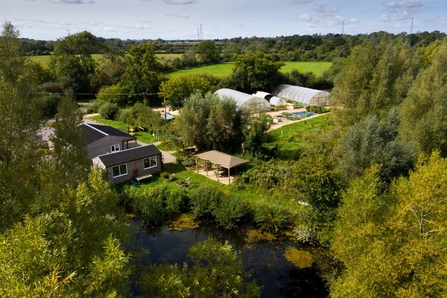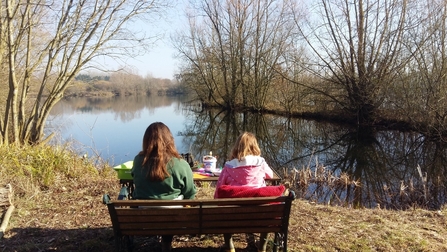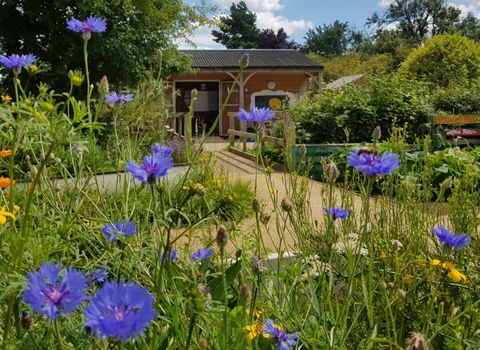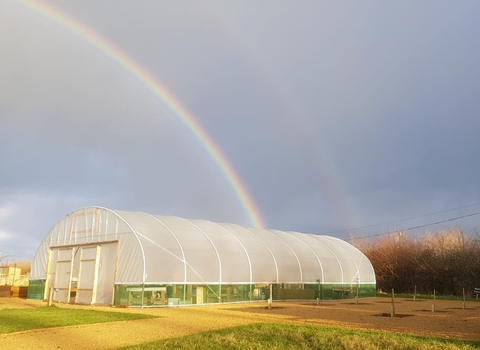What is a Care Farm?
Wiltshire Wildlife Trust currently has two Care Farms: Lakeside, near Oaksey and The Willows, in Broughton Gifford. We are the first of The Wildlife Trusts to successfully develop and run a Care Farm. Both Care Farms have been awarded the Social Farms & Gardens Green Care Quality Mark.
Care Farms provide a supervised, programme of farming-related activities. There are now around 180 Care Farms in the UK, each showing how contact with nature has a powerful role to play in helping those with mental ill-health, autism, social and communication difficulties, disabilities, and those in need of emotional support.
Each Care Farm varies in how it meet local needs and can offer individual and group interactions over the course of days, weeks, months or years, providing or promoting healing, mental health, social or educational care services. They provide opportunities for social interaction, skills-building and purposeful work.
Our Ethos
To provide a stable, consistent setting where every student can feel emotionally and physically safe and valued, and where they can progress at their own pace.
To identify our students’ needs and strive to help them meet desired outcomes through tailored, one-to-one support. For many, this will mean aiming to improve their wellbeing, life skills and coping mechanisms.
To build students’ confidence, self-esteem, independence and skill set to prepare them for their next steps.
To reduce students’ anxieties and their negative thoughts and feelings. To learn to cope with emotional challenges.
To provide a pathway to progression for the students. We listen to, nurture and guide them to where they want to be. This could be transitioning into school or college or helping to change their behaviours at home or school. We will challenge them and stretch their comfort bubble slowly and appropriately.
To be student-led. The structure we provide is framed by the staff as role models, who encourage, guide and support the student to meet their needs on a daily basis.
To provide a stable setting where students can feel successful. Rather than academia, we focus on ‘operacy’ – the ability to do things. Students can build on their interests, creativity and natural talents, and learn life skills such as how to problem solve, plan ahead and express themselves. Our learning-by-doing approach and focus on the process, not the outcome, means we can build self-esteem by celebrating every success relevant to the student and slowly remove the barriers put up from the feeling of failure.
To benefit from the therapeutic effects of physical activity and being surrounded by nature. Students are mostly outside where they have space to run, play and learn at their own pace. Being outdoors and not confined to a crowded, loud room has seemingly immediate therapeutic effects.

An aerial view of a Care Farm. Credit: Dean Sherwin
A student-centred approach
Who do we provide for?
Our students are varied in age and specific needs. We treat every student as an individual, providing one-to-one support, and tailoring programmes to their individual needs. Our age range has been 4-63, but has narrowed recently to 5-19 as funding for adult Special Educational Needs and Disability (SEND) groups has become more difficult to secure.
Many have diagnoses based around mental health, or are diagnosed with Autistic Spectrum Condition (ASC), Attention Deficit Hyperactivity Disorder (ADHD), Oppositional Defiant Disorder (ODD), Pathological Demand Avoidance (PDA), and Sensory Processing Disorder (SPD), whilst others have experienced childhood trauma. Many of our students fall under the category of additional needs referred to as Social, Emotional and Mental Health (SEMH) and thus have anxieties and challenges that affect their everyday lives, particularly in a busy school setting where their anxieties surface.
Whatever the reason they are with us we look beyond the student we read about on their paperwork to look at the individual in front of us. Specific outcomes required by referrers are as varied as the young people’s needs, with the common themes being to decrease anxiety, to be able to feel successful, to increase the students’ ability for appropriate social communication, for peer interactions to become positive, and to increase emotional literacy.
How does a child get a place at the Care Farms?
Our referrals come from four main sources:
- Local authority SEND Teams: mainly Wiltshire Council, for whom WWT is an approved provider, Swindon Borough Council and South Gloucestershire Council
- Direct referrals from schools
- Home schooling parents and carers
- The Independent Psychology Service (TIPS)
We are also starting to receive queries from mental health services.
Our students are with us for anything ranging from a half day, so they can have respite from the stresses of mainstream school, through to those for whom school currently cannot meet their needs, and thus they are with us up to three days per week; we may be the only provision they attend. Most students stay with us until a mainstream or special school placement is found, or until they are able to return to their school full time, if appropriate. Many of our students are on ‘packages’, whereby they are not in mainstream school classes, yet do not meet special school thresholds, so they attend several Alternative Provision settings each week.

Care Farm staff and student. Credit: Dean Sherwin
Typical activities
The day to day operation of the Care Farms has a focus on the therapeutic use of animals and horticulture, along with Forest School activities and meaningful education and work-based experiences in horticulture, nature conservation, woodworking, and site maintenance and development. Wrapped around these are more traditional methods of environmental learning, such a floral and faunal identification, nature walks and bird watching and activities such as camp fire cooking and whittling. Play is particularly important to many of our students, and this provides excellent opportunities to develop collaborative social skills.
We are also accredited providers of Assessment and Qualification Alliance (AQA) Unit Awards and the John Muir Award, an environmental award scheme that encourages people to connect with, enjoy and care for nature. We naturally embed numeracy and literacy in to our day-to-day activities, such as measuring for a woodwork project, using guides to identify insects, and imaginative story telling around the fire.
Care Farm staff
Our staff across both sites hail from a variety of professional backgrounds. These include: SEND work, Forest School, teaching, psychology studies, care work, horticulture, animal behaviour, outdoor learning, wood working, conservation, community farming and more. The mixed demography and backgrounds, perspectives, temperaments, knowledge, experience, skills, and education are vital for our collective intelligence. Staff training is essential and increases staff confidence. All staff are provided with training in positive behaviour management, safeguarding, outdoor remote first aid, food hygiene and autism as a minimum.
Find out how we are making a difference in our latest newsletter...
Quotes from Care Farm users
Thank you for all you have done for R. It’s amazing. I have got my old son back, the one I used to have. It’s down to what you have done with him at the Care Farm
I love Mother Nature. She’s fascinating
Thank you so much for all everyone has done for A. Without the farm I think his situation would have been very different. The farm has helped him tremendously, it has built his self-esteem, reduced his anxiety, mental health and improved his overall wellbeing. It is/was A's happy place and we are just so sad it has come to an end. He will miss it hugely. Hopefully he will visit on any open days you have. We can't express how grateful we are for all everybody has done for him. The farms are a huge asset to Wiltshire and the children who are able to access it are so lucky to have such wonderful places to go to.
I have never seen such a transformation in two such children. It’s been wonderful.
It’s nice to see the boys so relaxed and smiling and that’s been since they started at The Willows.
Thank you for all you do with P. You have restored our faith in people who care for children like P. You are truly amazing at what you do and your hard work is really appreciated by our whole family.
I would say The Willows is making my confidence better.
I came away so impressed and humbled by the work that you all do and the way in which the students engage and are supported.


